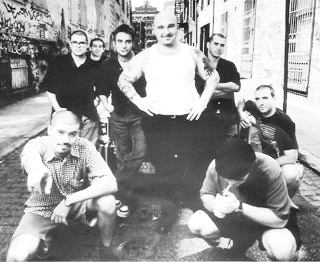Roadkill
Fri., April 17, 1998
Los Fabulosos Cadillacs
Liberty Lunch
Tuesday, April 21
The rat-a-tat-tat of two sticks on a snare leave a few precious seconds before a militia's front-line of drum pounding erupts like a New Orleans second-line explosion. Then the whistles begin, and out of their midst someone yells in Spanish, "T'estan buscando matador," like a town crier's midnight call to arms. Guitars and keyboards drop in their staccato chanka-chanka ragga beat before a napalm blast of brass clears out the tribal rhythms for a barroom squad of Sandinistas shouting "Matador, Matador" in all their Latin machismo glory. In his plaintive cry, the singer pleads to his subject, "¿Matador t'estan buscando, Matador t'estan matando, donde estas Matador?" (they're looking for you, they're killing you, where are you?) in the song's third-world tale of repression and revolt.
Not since the Clash's "London Calling" has a political anthem been both as chilling and as charged as "Matador," a highlight from one of last year's best mix-tape compilations, the Grosse Pointe Blank soundtrack, and a perfect reference point for Los Fabulosos Cadillacs. Together 13-14 years, with nearly that many albums to their name, Los Fabulosos Cadillacs are not only one of Argentina's most popular bands, they're also a leading exponent of another musical movement dwarfed by "electronica" - and one that hasn't been seen thus far in Austin (except through limited SXSW exposure): "Rock en Español." Y'know, rocanroll, only in Spanish. Like the Los Fabulosos Cadillacs: the Clash, only in Spanish.
"That's a big influence," says the group's keyboardist Mario Siperman in Spanish. Like most of his comprades, Siperman speaks little or no English. "That was our first influence, our main influence, the Clash. We've done `Guns of Brixton' and `Revolution Rock.'"
Like "Matador," Los Fabulosos Cadillacs' cover of the Clash's "Revolution Rock" appeared on their 1994 Sony Latin greatest hits collection, Vasos Vacios (empty glasses). The next year, with Réy Azucar (sugar king), former Clash guitarist Mick Jones solidified the connection by guesting on the group's "Mal Bicho" (bad bug). Though Los Caddies' 12th and most recent release, Fabulosos Calvera (fab skeletons) has seen proper stateside distribution through BMG's Latin arm, it evinces neither "Matador" nor a Clash cover. Instead, the group's infectious and dizzying carnival ride through ska, reggae, mariachi, punk, death rock, and even jazz prevail - all played with the wild abandon of Mano Negra? Sepultura? Django Reinhardt?
"There are other influences," says Siperman in his all-lowercase, soft Spanish slur. "But they're not big influences. We're eight right now, and most of the music is big and experimental with lots of different rhythms. That's what people are getting into - the energy. We wrote `Matador' four years ago, but because of the movie, people now know some of the songs. Since bands from Argentina are not going to get played on the radio in the United States, word of mouth is all we have. That song has been good for that. For us."
T'estan buscando, Matador! -Raoul Hernandez







